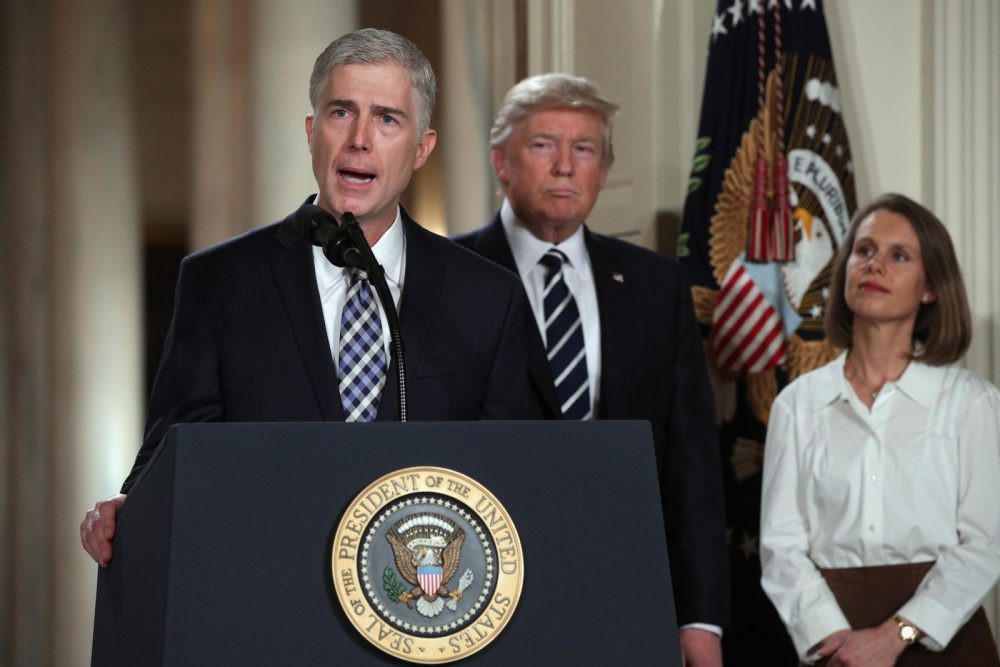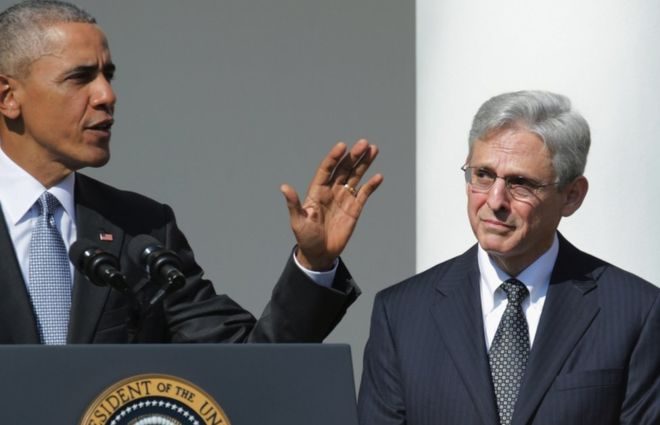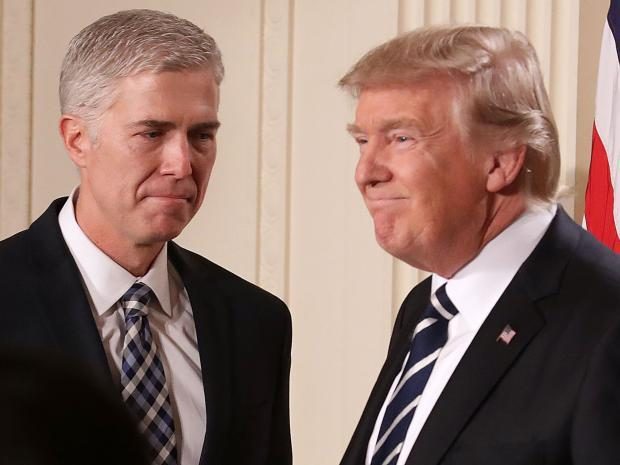A stolen election, a stolen SCOTUS seat.
As I write this, it’s only Day 13 of the Trump presidency. The pro-woman, pro-POC, pro-LGBT, pro-immigrant tenure of Barack Obama seems a vague memory already, a mere two weeks since he left office. Hillary Clinton, winner of America’s votes by three million, but victim to the winner-take-all Electoral College system, seems like a dream we once had of gender parity in both the White House and the Cabinet.
Interference in America’s election by Russia’s President Putin and Wikileaks founder Julian Assange gave us the first stolen election of the 21st century. The 240 year old glass ceiling over women candidates remains in place, cracked though it may be. The disgrace of our stolen election will be recorded in history books.
It’s already been noted in every nation around the world–except Russia, of course–as an international outrage. Global leaders have voiced their opposition to the Trump presidency, most recently the president of Mexico, prime ministers of Canada and Australia and chancellor of Germany–each in the past few days.
As I write this, it’s a mere 48 hours since President Trump fired Acting Attorney General Sally Yates, whose name is already receding into the world of internet memes as Trump visits new assaults on democracy. Yates was fired for doing her job–upholding the Constitution.
She ordered the Justice Department to refuse to support a controversial executive order banning entry into the U.S. of Muslims on fully vetted visas two years or more in the obtaining. Yates was following federal law after three federal judges ordered stays against the ban on Jan. 28.
But we’ve moved past all that because in the whirlwind of the Trump presidency, life comes at you fast.
On Jan. 31, in a prime time event staged just like reality TV, Trump revealed his nominee for the U.S. Supreme Court (SCOTUS), Neil Gorsuch, Federal Judge on the Tenth Circuit Court of Appeals in Denver.
Gorsuch would fill the vacancy left in February 2016 by the sudden death of Justice Antonin Scalia.
If confirmed, Gorsuch, 49, would be the youngest justice on SCOTUS, which is a lifetime appointment. If he remains on the court as long as the longest serving justices, he could still be on SCOTUS in 2056, if he were still alive. The oldest justice, Ruth Bader Ginsburg, is 83. The longest serving, Anthony Kennedy, is 80. He was appointed by Ronald Reagan.
Despite a plethora of mostly ill-advised, cruel and even dangerous executive orders delivered by President Trump in the past two weeks, there is nothing Trump can do that can impact the nation longer than seating someone on the SCOTUS. His choice of Neil Gorsuch was designed as red meat for his base and the GOP and to goad the Democrats and the 66 million Americans who voted for Hillary Clinton.
March 16, 2016, then-President Obama nominated Merrick Garland, Chief Judge of the United States Court of Appeals for the District of Columbia Circuit, to fill the vacancy left by Scalia’s death.
Garland was considered by some on the left like Bernie Sanders, to be too centrist a choice, but Garland has one of the most stellar records on the federal court and had been approved unanimously by the very same Congress in 2012 for his current position. Obama presumed no one would be able to criticize the choice and Garland would easily be confirmed.
In what will be recorded as one of the most outrageous events in SCOTUS history, Senate Majority Leader Mitch McConnell (R-KY) said there would be no hearings on Garland and the next president would choose the SCOTUS nominee to fill Scalia’s seat. McConnell argued that Obama was a lame duck president and “the people should choose.”

Yet when Obama nominated Garland, he had nearly a year left of his presidency. McConnell said it was “unprecedented” to appoint a new justice in an election year. But the longest serving justice on the SCOTUS, Anthony Kennedy, was himself appointed in an election year, 1988, and began serving on the court 10 months before Reagan left office while Reagan’s own vice president was running for president. Kennedy was nominated after Reagan proposed two other justices who were rejected by the Senate.
So the appointment of Garland would not have been unprecedented.
Not a single Republican in Congress objected to McConnell’s pronouncement and for 300 days Garland’s nomination languished.
Over that period of time, Republicans also argued–because everyone assumed Hillary Clinton would win the presidency since no one expected a virtual coup from the FBI and Russia–that the SCOTUS seat could remain vacant throughout Clinton’s presidency. McConnell, Sen. Ted Cruz (R-TX), Sen. John McCain (R-AZ) all were on record stating they would also refuse to hold hearings on any nominee proffered by President Hillary.
And now we are here, with the nomination of Neil Gorsuch, a classic constitutional originalist–meaning he believes the Constitution should be adhered to as it was originally enacted, and not broadened nor viewed as a document that must grow over time. This is why Gorsuch is against Roe v. Wade. One wonders if he would feel equivalently about Plessy v. Ferguson or Brown v. Topeka Board of Education, but these are questions I doubt he would be asked by the Senate who just let Jeff Sessions through the door on the first day of Black History Month.
Gorsuch is being touted for exactly the same reasons Garland was: stellar academic background, long list of publications, significant case law. But for women, people of color, immigrants and LGBT people–a majority of Americans–Gorsuch is a truly bad fit.
Gorsuch is also simply not as qualified as Garland, who is both a former federal prosecutor and has been a sitting judge on the nation’s most important and visible federal appeals court. That Garland is more moderate yet can in no way be construed to be left-leaning like Ruth Bader Ginsburg and Stephen Breyer, means Trump could have and should have nominated him.
Doing so would have done no damage to the balance of the SCOTUS, but it would have gone a long way toward healing some of the rifts–some would argue chasms–created by Trump’s first two weeks in which he has continued to focus on a small group of white male Americans, eliding the majority.

In one of the more ironic asides of this state of continual irony in which America finds herself is this: Gorsuch himself thought the failure of the Republican Senate to hold hearings on Garland was as appalling as it was. New Supreme Court nominee had once called Merrick Garland “among the finest lawyers” of his generation.
Of primary concern are Gorsuch’s views on abortion, LGBT rights, immigrant and voting rights. Regrettably, he falls far to the right on all these issues.
Vehemently pro-life, Gorsuch has authored a book, “The Future of Assisted Suicide and Euthanasia,” which can easily be extrapolated to address his abortion stance. In that he wrote, “human life is fundamentally and inherently valuable, and that the intentional taking of human life by private persons is always wrong.”
Gorsuch revealed his views on LGBT equality in an article for the conservative journal National Review, titled “Liberals ’N’ Lawsuits” in which he argued that “activist judges” –which he himself could easily be construed to be–were damaging case law in America. Gorsuch wrote, “American liberals have become addicted to the courtroom… as the primary means of effecting their social agenda on everything from gay marriage to assisted suicide…”
Fixing the abrogated civil rights of all Americans can’t be termed damaging case law nor a social agenda, which is why it would be good if Gorsuch could be asked about Plessy or Brown–but he can’t because we cannot impose in the Senate Judiciary hearings the kind of litmus tests some presidents do when choosing nominees.
Advocacy groups have been quick to weigh in on Gorsuch and none has been flattering. Planned Parenthood denounced Gorsuch with a hashtag: #NoRoeNoGo. NARAL was equally succinct with a #StopGorsuch hashtag:
Neil Gorsuch would roll back our hard-won rights. We can’t let him become the next #SCOTUS justice. https://t.co/Kz27mZq2UO #StopGorsuch pic.twitter.com/coHrVUisWu
— NARAL (@NARAL) February 1, 2017
Since one of Trump’s first executive orders was the Global Gag Rule disallowing funding for women’s health clinics that save lives worldwide, followed by an executive order beginning the dismantling of the Affordable Care Act/Obamacare, we know how serious Trump is about ending abortion rights.
Gorsuch has already weighed in on the infamous Hobby Lobby Stores v. Sebelius case with regard to the ACA and contraception and to the protection of LGBT people at the workplace.
The Hobby Lobby case continued the Citizens United assertion that some private corporations qualify as “people” under federal law and as such have a right to deny basic healthcare coverage if it violates religious beliefs.
This meant women could be denied access to contraception for any reason–either as birth control or as medical intervention for a range of health issues including endometriosis. It also meant transgender employees could be denied access to hormone treatment.
LGBT rights groups are opposed to Gorsuch. GLAAD issued a statement immediately after Gorsuch’s nomination from president and CEO Sarah Kate Ellis.
Ellis said, “Neil Gorsuch’s harmful history of discrimination against the LGBTQ community renders him completely unfit to sit on the highest court in the land. He has record of advocating for anti-LGBTQ rhetoric or supporting candidates that are in favor of open discrimination against people and families who simply want to be treated the same as everyone else.
Gorsuch’s presence on the Supreme Court will affect the law of the land for generations to come – long after Trump is out of office, and will turn back the clock on equality and acceptance.”
Human Rights Campaign President Chad Griffin was equally adamant. “Never in the history of our movement have we had more at stake as a community, or as a country,” said HRC President Chad Griffin.
“Since the moment he stepped foot in the Oval Office, President Trump has attacked equality. He has signed executive orders that undermine our country’s most cherished values and appointed anti-LGBTQ cabinet nominees who have spent their careers undermining civil rights. And now, he has nominated Judge Gorsuch to the Supreme Court, fulfilling his campaign promise to nominate a justice in the mold of Antonin Scalia, one of the most vehemently anti-LGBTQ justices to ever sit on the court who once went so far as to compare gay people to murderers.
The Supreme Court has played a central role in advancing the promise of equality for LGBTQ Americans, and Judge Gorsuch’s anti-equality record — from opposing crucial medical treatment for a transgender person to supporting a license to discriminate for private corporations — make him unfit to sit on the nation’s highest court. We cannot afford a justice who will roll back our rights, or who will be a rubber stamp for Donald Trump’s unconstitutional actions. And America cannot afford to have Judge Gorsuch on the Supreme Court. We oppose this nomination.”
.jpg)
In addition to Roe v. Wade, there are key protections for LGBT people that have been secured solely through the courts. Among these are the ending of sodomy laws against lesbians and gay men–laws that resulted in many women losing custody of their children. There were also the recent decisions on marriage equality for lesbians and gay men. And there’s no doubt that at some point in the not-so-distant future, the so-called “bathroom bills” like North Carolina’s notorious HB2, which primarily impact gender non-conforming lesbians and trans persons, will end up before the SCOTUS.
To assert that Gorsuch presents problems for majority America and will speak only to a small segment of the population with the sort of rulings he has made understates the reality. Given the SCOTUS will likely be asked to rule on questions of the president’s own violations of the Constitution, given his violations of the Emoluments Clause as well as the current violation of the First Amendment presented by the Muslim ban, it will be essential for Senate Democrats to demand clear answers on these questions.
There is a call by both activists and voters for Senate Democrats to obstruct Gorsuch the same way Garland was obstructed. It’s a reasonable request, given Republicans were comfortable leaving Scalia’s seat vacant not just for the 300 days Garland languished, but for a possible four more years of a Hillary Clinton term.
#BarbaraKruger was right.#NeilGorsuch has made the bodies of women a battleground.@SenateDems must fight back.pic.twitter.com/Dg5hhMHC5A
— Victoria Brownworth (@VABVOX) February 1, 2017
Another concern is Gorsuch has favored so-called religious freedom laws which have been used repeatedly to discriminate against women and LGBT and now, Muslims. That these laws will only be broadened under the new administration is increasingly evident. The majority of Trump’s Cabinet nominees are religious zealots with ties to anti-gay hate groups like the Family Research Council. Vice President Pence has been an avid supporter of FRC, as have proposed Education Secretary Betsy DeVos and White House Chief of Staff Reince Priebus.
How quickly the Senate will attempt to move on Gorsuch remains to be seen. Some of Trump’s nominees are still being vetted by the Senate–a source of consternation from the president, who voiced no such concerns when the GOP Senate held up the hearing for Attorney General Loretta Lynch for 180 days. Nor did candidate Trump comment on the treatment of Garland.
When will the Democrats give us our Attorney General and rest of Cabinet! They should be ashamed of themselves! No wonder D.C. doesn’t work!
— Donald J. Trump (@realDonaldTrump) January 31, 2017
When he announced Gorsuch, Trump said he was fulfilling a campaign promise to appoint a stand-in for Scalia. Trump invited Scalia’s widow Maureen to the nomination and made references to her in his announcement.
During his campaign, Trump had repeatedly asserted at rallies, “Even if you can’t stand Donald Trump, you think Donald Trump is the worst, you’re going to vote for me. You know why? Justices of the Supreme Court.”
Hillary Clinton had made a request to remember the SCOTUS when voting, but she never framed it the way Trump did.
 With his SCOTUS pick, Trump had an opportunity to redirect some of the rage the majority–the millions who did not vote for this historically unpopular president–feel toward his presidency. He had the opportunity to address what even many Republicans consider a stolen election and all Democrats consider a stolen SCOTUS seat with a moderate choice–or even with the eminently qualified Merrick Garland himself.
With his SCOTUS pick, Trump had an opportunity to redirect some of the rage the majority–the millions who did not vote for this historically unpopular president–feel toward his presidency. He had the opportunity to address what even many Republicans consider a stolen election and all Democrats consider a stolen SCOTUS seat with a moderate choice–or even with the eminently qualified Merrick Garland himself.
Instead Trump chose an ideologue who represents a small but vocal political phalanx in America. Proving once again he has no intention of being a president for all Americans, but only a president for his increasingly smaller base of sycophants.
